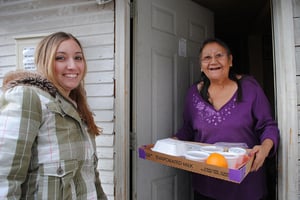 Our American youth culture has forgotten our seniors. It isn’t accurate to accuse us of neglecting or abusing our seniors. No, caught up in the everyday business of our hyper-success culture, we simply don’t think about our senior population unless we have to. As long as we feel we’ve made reasonable accommodations for our seniors (Social Security and Medicare) we tend to pay closer attention to our careers and our children.
Our American youth culture has forgotten our seniors. It isn’t accurate to accuse us of neglecting or abusing our seniors. No, caught up in the everyday business of our hyper-success culture, we simply don’t think about our senior population unless we have to. As long as we feel we’ve made reasonable accommodations for our seniors (Social Security and Medicare) we tend to pay closer attention to our careers and our children.
A Glance at The Elderly
However, did you realize that:
- 12,000 adults turn 60 every day in America.
- Our 60+ population will reach 118 million by 2060, more than double the number in 2010.
- 9.5 million seniors are threatened by hunger.
- 7.1 million seniors live in poverty.
- 5.5 million go hungry without saying anything.
- 25% of seniors live alone.
- 20% suffer from loneliness and depression.
Who Is Looking?
When Meals on Wheels launched, one quarter of the nation’s senior population lived in poverty, isolation, and was going hungry. A social worker noticed.
In January 1954, a group of people in Philadelphia experimented with a home-delivered meal service for seven seniors. Margaret Toy, a social worker in Philadelphia's Lighthouse Community Center noticed this compassionate effort and asked a local foundation for a grant to extend the program across the city. As is the case even today, the seniors who Margaret sought to serve back in the 1950s did not require hospitalization or skilled nursing care, only some help with meal preparation in order to maintain their independence.
This first Meals on Wheels program charged 40 to 80 cents per day (according to ability to pay) for the meals, which consisted of a hot lunch plus a serving of milk, a sandwich, and a side dish to be eaten as a cold supper in the evening. The fee was intended to maintain the seniors' sense of dignity as well as to partially defray the expenses of the program. By 1955, the Philadelphia Meals on Wheels program was introduced in Columbus, Ohio, and Rochester, New York; it then spread rapidly across the United States and Canada.
Meals on Wheels Today
Meals on Wheels America is the oldest and largest national organization supporting the more than 5,000 community-based senior nutrition programs across the country that are dedicated to addressing senior hunger and isolation. Meals on Wheels has been guided by a single goal – to support our senior neighbors to extend their independence and health as they age. This network, along with more than two million volunteers, currently helps more than 2.4 million seniors in virtually every community in the country. It delivers the nutritious meals, friendly visits and safety checks that enable America’s seniors to live nourished lives with independence and dignity. For this reason, Meals on Wheels saves us all billions of dollars in Medicaid, health and long-term care expenses. In fact, for every $1 invested in Meals on Wheels, we save up to $50 in Medicaid spending.
How it Works
To receive Meals on Wheels, have your senior or family member call the closest regional group and ask about eligibility. Seniors must be 60 years of age or older to be eligible for this federally funded meal delivery program. Some programs charge between $2 and $5 per meal, federally funded programs may only ask for a voluntary contribution and some are free. Ask if there is a waiting list.
Meals are delivered to the home of seniors by a driver, who may be either paid or a volunteer. In many areas, Meals on Wheels drivers are recent retirees who can take the time to chat for a few minutes with the senior as well as drop off the hot lunch and brown-bag supper. A few programs offer deep-frozen meals as an option. Many local programs also train their drivers to be alert for signs of health or safety problems in the senior's house.
Compassionate and Efficient
Meals on Wheels is, perhaps, the most moving example of the compassion of one social worker leading to a national effort to serve our neediest fellow citizens. In the words of 93-year-old Betty Hanover, “It’s my big meal of the day and big excitement of the day.”

